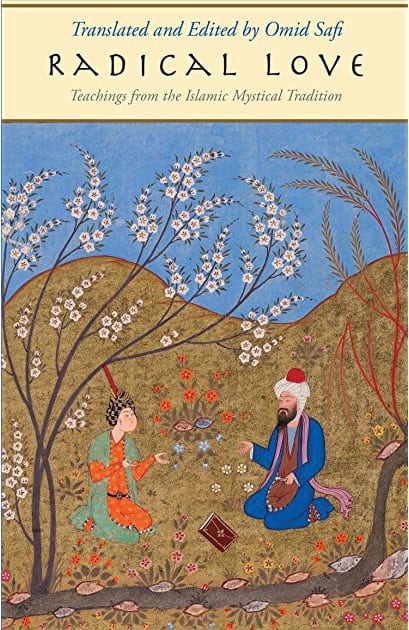Radical Love in Our Country
An Interview with Omid Safi
By Jenara NerenbergOmid Safi is a celebrated academic, Islamic scholar, On Being columnist, and author of several books including his latest, Radical Love: Teachings from the Islamic Mystical Tradition. With a strong focus on contemporary movements and linking mystical traditions of Islam with the work of Dr. King and Malcolm X, his new book renews and refreshes our sense of hope and humanity through original poetry translations. Safi is currently director of Duke University’s Islamic Studies Center and leads travelers to countries like Turkey and Morocco through his Illuminated Tours to help visitors learn about the region’s rich spiritual history. We spoke with Safi about his new book and its implications for social justice work and developing a contemplative practice.
Jenara Nerenberg: I wanted to just start by asking what compelled you to write this book now and focus on radical love within the Sufi tradition?
Omid Safi: I feel like where we are in the world with a lot of the tumult and unrest that I see around us—with no immediate sign of let-up in sight. It seems even more necessary than ever to be doing what is required to replenish our hearts.
It really is a generational and maybe even multi-generational marathon for healing work that is required everywhere. In our hearts, in our families, in our neighborhoods, in our nation, on the planet.
And so I’ve just been focusing more and more on the need to anchor and ground the work of social transformation—that so many of us care about—with the heart work, with the work of love, with the labor of love. And so paying a lot more attention to what are the teachings that come out of my own traditions that I think exemplified that.
And not surprisingly, I think the deeper we go or the higher we go, the more we also find that these same teachings are found in other traditions and they speak to other traditions. So I’ve been very deeply moved by the fact that so many of these teachings of radical love that I find in the Islamic tradition very much also echo and amplify the teachings that I also encounter in other love teachings that are also very dear to my own heart.
In particular the work of the Black Freedom tradition, the Civil Rights Movement of Dr. King, and others. And these are two traditions that sort of simultaneously occur in a lot of my own work, and to find the two of them so resonant that if you close your eyes sometimes you have a hard time figuring out which one is coming from where is very inspiring.
Jenara Nerenberg: Absolutely, and you were talking about social justice efforts these days and your intention to link that work with matters of the heart. Do you see that as a disconnect in Western culture or in some of the modern activist movements—that there would be a need to link them more to a heart-centered space?
Omid Safi: I do. I think part of it is there is a tendency sometimes to treat the work that we see happening at the social level, the political level, the environmental level, as purely a kind of outward phenomena, an external phenomena.
At the same time I think there’s a mistaken tendency—a misplaced tendency—to want to see love as purely a private matter, whereas the Sufis and mystics that I’ve been immersing myself in and working to bring out the teachings of talk about love not as a sentiment, not as an emotion, but as the unleashing of God unto this realm. And love as the very cause of creation. Love as the very being of God. Not even a divine quality—it’s actually the very being of God. And it’s love that brings us here. It’s love that sustains us here, and love is also the path that we must walk on and must journey on to find our way back home.
So I think, because of that, there’s always a tradition in these teachings that talks about love as being the reality that’s bigger than us. We have to swim in love. We have to become this love. So I think, on one hand, there’s been a tendency among some activists to only focus on, if you would, the political or the mental aspects of the movement, but without paying as much attention to the love that underwrites it.
And there’s also tendency among some spiritual seekers to treat love as purely a matter of consciousness, purely a matter of individual experience of love, instead of really seeing love as this cosmic movement, as this divine unfolding.
And what I’m kind of trying to get back to is, of course, a recognition that if one has love, and if you recognize that other people love their babies as much as we love our babies, then of course we could never stand to be silent when we see other people suffer. And the way that some of the teachers in this tradition put it, “Rocks would cry out if you were to be silent.”
And so I think that this intertwined love and justice tradition is what I’m trying to dwell on in this book. And I hope to some extent it can be an offering for people who are interested in it.
Jenara Nerenberg: And what kind of link do you see between contemplative practice and the Sufi tradition or how radical love can inform a person’s contemplative practice?

“Radical Love” by Omid Safi. Image courtesy of Yale University Press
Omid Safi: I think this notion of a contemplative practice is so much at the heart of what it means to be human. For so many people that you come across today, when you ask them how they are doing, the only response you get is just like this pitiful shaking of the head and “I’m so busy. I’m so busy.” And no one is happy when they talk about how busy they are! And I think this love tradition actually calls us to something different. It actually calls us to recognize that there is a joy that comes when we pause long enough to reflect on not just who we are, but actually what we are.
And this love tradition calls us to remember to rise above these confines of the ego and of the self and to remember that we are made in love. We’re made through love.
In many Sufi cultures, the first question you ask someone is “How is the state of your heart?” And this is everyday language! “How is the state of your heart in this very breath that you’re taking?” And that’s their everyday phrase for “How are you?” So I think it’s very important for me that when we speak about contemplative practices that we ground this in our daily practices.
So really the goal is to perpetually have love overflow until each and every living entity, every human being and every sentient being is included in our circle of love. Part of this widening of the circle of love, compassion, and tenderness is a very deliberate practice, a focusing on what we have set as the limit of our kindness.
Who is it and what is it that we have defined as being on the outside? And to recognize that as a place that we have to continue to grow.
Jenara Nerenberg: When I read your book and the different passages, it’s thrilling and I get filled with that sense of overflowing cosmic love. Do you have further thoughts about how to bridge that state of being with what is happening in our country and where we’ve gone wrong?
Omid Safi: I think any kind of dichotomy, any kind of duality, brings us pain. And there’s joy, of course, in union. I mean that’s the reason why there’s so much sensual poetry out there that talks about union as a model, as a taste of mystical unity and mystical oneness.
So I’m not a huge fan of these kinds of divides, for example the head versus the heart. But since that’s a language that many people do end up using, one of the things that I love is how much these teachings openly talk about how love compels you to care for one another.
And with love, we don’t end up doing a cost-benefit analysis. We simply extend ourselves towards one another. One of my favorite poems that I have in this book is from Rumi. He says, “You and I have to live as if you and I never heard of a you and and I.”
And I love that part—that we have to live as if you and I never heard of a you and an I. And I think there is such a healing in this kind of a recognition.
If we are alive today the reason that we’re alive is that somebody loved us. And somebody sacrificed for us. And I think that’s a taste of this radical love that they’re talking about.
And this radical love is life-saving. And quite literally all of us are alive because of this love. So it’s not just that we are conceived through love, it’s not just that we are an image of God—our very survival is because night in and night out, day in and day out, somebody loved us. And it’s because of all of this that our lives are precious and sacred and worth saving.
Jenara Nerenberg writes and speaks widely and is the producer of several author initiatives for The Neurodiversity Project, Garrison Institute, and the UC Berkeley Greater Good Science Center. An Aspen Ideas “Brave New Idea” speaker, her work appears at Fast Company, Susan Cain’s Quiet Revolution, and elsewhere. You can find her on Facebook and Twitter.
Photo by Tyler Gebhart on Unsplash.com.
